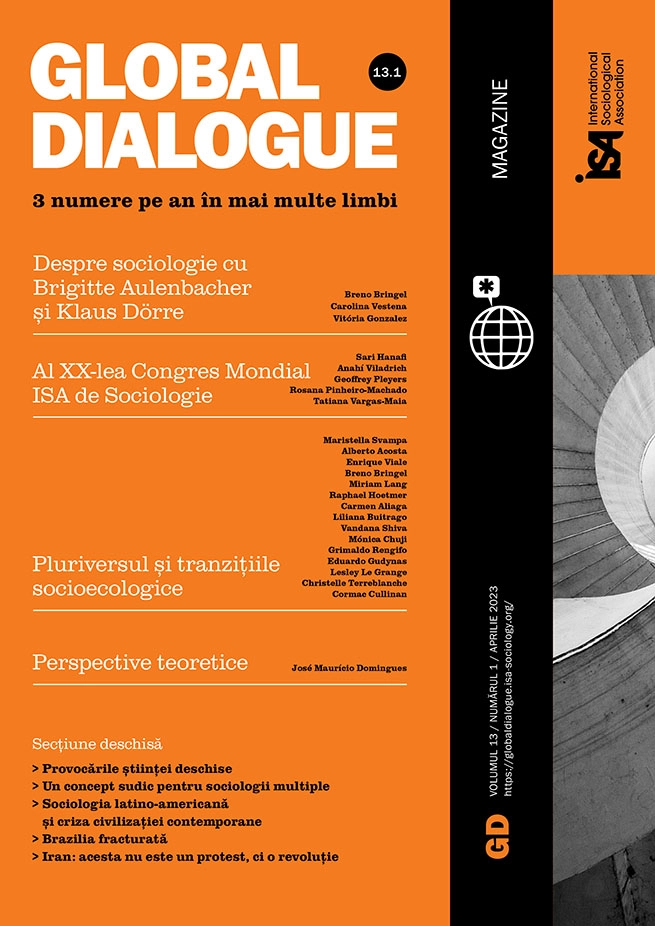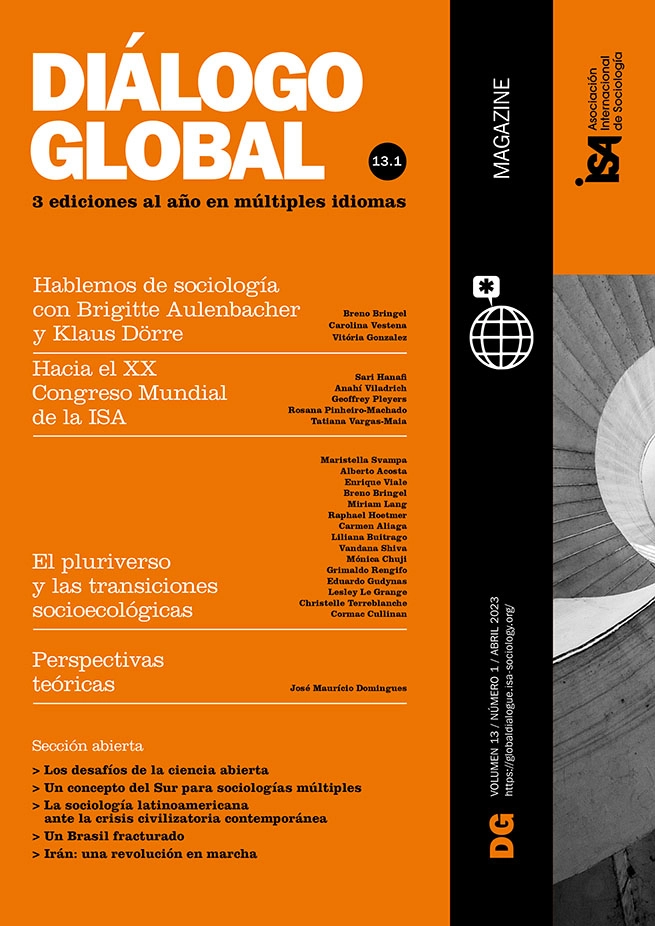Post-Pandemic Tendencies and the Phases of Modernity
March 09, 2023
The coronavirus/COVID-19 pandemic that befell the world in 2019-20 implied a sea change in the articulation between state and society. Since 2008, neoliberalism had been in check. The pandemic suddenly brought about what may be called emergency Keynesianism and an amplification of social policy to keep whole countries afloat. What just a few months or even days before had been unimaginable became possible: the measures taken and the amount of money thrown into the economy and safety nets were astonishing. There was an amazing return of the state, with all its “capabilities,” to face up to the situation[1].
Can we speak of an epochal change, or is it just changes of less import that we observe? Will the shifts last? Is this a moment of punctuation in the otherwise stable trajectory of policy?[2] In what follows I will sketch an answer regarding the intervention of the state in the economy and social policies, with a prior discussion of the phases of modernity. Strictly concerning the political system, continuity prevails, despite the deeper changes demanded in many quarters of society. Liberal democracy is a mixed regime, and the trend towards more oligarchy and less democracy, unfolding since the 1980s (towards advanced oligarchical political systems), has not been reversed. There is also an evident increase in surveillance. Politicians remain largely concerned with themselves, their power, and the rich, though pressure for more robust social policies has been mounting. Individualism is rampant, and the pandemic may have exacerbated it, provoking mostly defensive and private-oriented attitudes, in contrast for instance to the intensification of sociability in the aftermath of the “Spanish flu” pandemic a century before. This is certainly an issue that awaits sociological analysis. What I have to say here applies only partly to the world of the renewed party–state-cum-capitalism system, where the presence of the state is much more intense and a much more authoritarian political system operates. However, regarding social policies, the prevalence of social liberalism is telling.
Modernity and its phases
Modernity – political modernity included – is a contingent evolutionary divergence. It has, however, counted on previously developed civilizational elements with increasingly global characteristics, along with hybridizations, and its dominant forces defeated the relatively short-lived challenge authoritarian collectivism presented. It has developed, since the late eighteenth century, in three distinct phases (as shown by the work of Offe, Lash and Urry, Castells, Wagner, Domingues, and others). The first was liberal and market-oriented (or regarded this as a program); it was simultaneously colonial (though the Americas were already independent). The second was state-based, around the world. Though the liberal economic and juridical structure remained in place, “real socialism” (more appropriately called authoritarian collectivism) radicalized the state elements it borrowed from modernity, discarding the liberal and market infrastructure. Then a third phase, more complex, more individualistic, with a greater presence of networks – alongside the reinforced market and the state – and under the aegis of neoliberalism set in.
Are we, in the post-pandemic world, witnessing the emergence of a new phase, or is it only an inflexion that has come about within the third phase? Outside the party–state domain, neoliberalism was the dominant game in town until recently (and its supporters struggle to maintain its dominance). However, we can suppose that the association of the third phase of modernity with neoliberalism was merely contingent, regardless of the profound imprint it will leave on the world, whatever else happens.
The state, the economy, and social policy
Already before the pandemic, neoliberalism was seen as too limited to cope with the economy; more or less explicitly or implicitly, governments were already moving away from some of its tenets, and now powerful agents appear to be increasingly aware of the problem. Implementing change has been more complicated, though, with inconsistencies, resistance and opacity frequently characterizing recent developments. Although I cannot develop this issue here, geopolitics and competition between China and Western countries also loom as a backdrop to the present transformations, with the former for a long time now making use of a complex mix of neoliberalism and strong state intervention.
Take for instance the European Union. We can discern three possible future scenarios: one conservative (business as usual); one somewhat chaotic and conflictive; and one transformative, in which the goals of meeting the challenges of climate change (especially through an energy transition), digitalization and revamping social policy are achieved, along with changes in taxation. The NextGenerationEU project, with common funds from money borrowed in the market, already moves the EU in the direction of the third of these possibilities, with a strengthening of the “European state,” which can make the tasks of even powerful national states easier (by combining with them; for instance, through financing up to 40% of France’s relaunch plan which aims to enact technological renewal up to 2030). Regarding taxation, apart from a global flat tax rate of 15% on corporations, in order to avoid their tax heaven schemes and, more generally, tax evasion, not much has been discussed (save in the United States, where taxes on the rich have been slashed). In any case, a global tax rate on corporations, which experts and politicians discussed for some time when the pandemic broke out, may still be limited, as critics argue, but it is unprecedented. Whether it will grow in strength is arguable (in Germany, for instance, maneuvers to avoid respecting the constitutional clause forbidding further debt have been adopted, with little ado), but a movement in this direction is likely to advance. In any case, the political system will mediate these regulatory changes. In the US, the eventual approval in August 2022, after fierce wrangling, of the Democratic Party’s 740-billion-dollar project to tackle inflation, push for the substitution of fossil fuels by renewable energy, and reduce medicine costs was a breakthrough, albeit far more modest than hoped for by the left.
Of special note are the proposals to finance a renewal of economic infrastructure, particularly in terms of digitalization but also of more prosaic things such as bridges and roads, and allow for a transition in energy sources capable of mitigating the ongoing climate change in both the US and Europe. Strategic, specifically high-tech areas are at stake above all, with microchips particularly standing out; lots of money and new organisms within the state will promote such goals and state procurement of innovative products (the usefulness of such a strategy was buttressed by how vaccines against the coronavirus were supported by the state). Industrial policy is making a comeback: though very different from in its heyday in liberal–capitalist countries (more “indicative,” that is), it has become far more relevant, compared to what happened in the last quarter of the twentieth century and the beginning of the twenty-first. Some speak of a return of planning, especially regarding climate change and energy transition. In any event, budgetary limitations overall have become much softer – while spending has become elastic, including even numerous bail-out operations.
In trade and financial regulation, a veritable change has been taking place. For decades, antitrust policies were downplayed, with the supposition that they had become self-defeating. Since the Reagan government, they were supposed to be concerned with consumer welfare. Hence dumping, slashing prices to defeat one’s competitors, for instance, was not seen as a problem. The goal was to protect competition as such, not specific competitors. Hence mergers and fusions creating gigantic oligopolies did not merit intervention. This is being completely revised, with antitrust policies becoming much more encompassing and detailed. Moreover, the regulatory scheme has expanded from a typical and more limited US institutional approach towards dealing with market services to consumers of, in particular, basic monopoly-like public goods (telephony and post, water and sewage, or trains and aviation) to encompass social policy and other activities.
Nevertheless, regarding social policy, we seem to be getting more of the same. Social liberalism, with a two-layer policy – one, market-based for the well-off; the other, state-provided for the poor – has become common wisdom. Thus far, no punctuation in the evolution of social policy, shaking the stability of steadily-expanding social liberalism, has robustly emerged. Whereas healthcare may become more universal, for the first time a globalized, social liberal response seems to be emerging in more general terms. While there used to be significant differences, especially between the center of the global system (as well as some authoritarian collectivist countries) and the periphery, the former with more robust and tendentially universalist policies, at present social liberalism has got the unquestionable global upper hand. It concentrates on poverty (on “equity,” not equality). Despite widespread social dissatisfaction, no organized forces have shown enough strength, or even really tried, to deflect social policy towards universalism and full social citizenship.
What is clearly set to prevail are cash transfer schemes. This may happen according to Latin American minimal grants and targeting[3] – to combat but also politically manage poverty – found in all such countries, but elsewhere too; or following the extremely mean German Arbeitslosengeld II (known as Hartz IV), with its workfare rationale. They are a sham in an increasingly wealthy and unequal world. It is true that something like the German new, improved Bürgergeld may eventually indicate new social-democratic pathways, between small amounts of money for the deserving unemployed and more generous universal provisions, despite firm resistance from the Christian Democrats (see also the recent Italian Reddito de cittadinanza, made even meaner by the Meloni government). In any case, as things stand right now, change will be limited.
The future
Only time will tell: it is possible that Minerva’s owl only spreads its wings at dusk. But we can at least highlight some specific tendencies that seem to have unfolded in the last few years and will probably intensify. Admittedly, it all depends on the unfolding of ideas and programs, and particularly of political struggles, whose outcomes do seem, however, to point consistently in one direction. Developments have been thus far uneven across the world.
We might hope that change would introduce a much more generous, greener, and solidary era in human history. This seems unlikely nevertheless; but it does not mean that a new phase of modernity, or an inflexion within the third one, is not emerging. Its final direction, however, is still uncertain.
[1] Domingues, José Maurício (2020), “From global risk to global threat: State capabilities and modernity in times of coronavirus”, Current Sociology, 70(1), 6-23.
[2] Baumgartner, Frank and Jones, Bryan (2009) Agendas and Instability in American Politics. Chicago: Chicago University Press.
[3] Domingues, José Maurício (2019) “Social liberalism and global domination”. In: Heriberto Cairo and Breno Bringel (Eds.) Critical Geopolitics and Regional (Re)Configurations: Interregionalism and Transnationalism between Latin America and Europe. London: Routledge, 49-62.
José Maurício Domingues, State University of Rio de Janeiro, Brazil, and member of the ISA Research Committees on Sociological Theory (RC16) and Historical Sociology (RC56) <jmdomingues@iesp.uerj.br>














